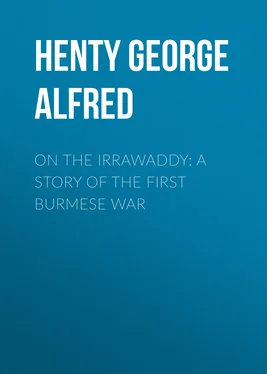George Henty - On the Irrawaddy - A Story of the First Burmese War
Здесь есть возможность читать онлайн «George Henty - On the Irrawaddy - A Story of the First Burmese War» — ознакомительный отрывок электронной книги совершенно бесплатно, а после прочтения отрывка купить полную версию. В некоторых случаях можно слушать аудио, скачать через торрент в формате fb2 и присутствует краткое содержание. Жанр: foreign_children, foreign_antique, foreign_prose, prose_military, на английском языке. Описание произведения, (предисловие) а так же отзывы посетителей доступны на портале библиотеки ЛибКат.
- Название:On the Irrawaddy: A Story of the First Burmese War
- Автор:
- Жанр:
- Год:неизвестен
- ISBN:нет данных
- Рейтинг книги:4 / 5. Голосов: 1
-
Избранное:Добавить в избранное
- Отзывы:
-
Ваша оценка:
- 80
- 1
- 2
- 3
- 4
- 5
On the Irrawaddy: A Story of the First Burmese War: краткое содержание, описание и аннотация
Предлагаем к чтению аннотацию, описание, краткое содержание или предисловие (зависит от того, что написал сам автор книги «On the Irrawaddy: A Story of the First Burmese War»). Если вы не нашли необходимую информацию о книге — напишите в комментариях, мы постараемся отыскать её.
On the Irrawaddy: A Story of the First Burmese War — читать онлайн ознакомительный отрывок
Ниже представлен текст книги, разбитый по страницам. Система сохранения места последней прочитанной страницы, позволяет с удобством читать онлайн бесплатно книгу «On the Irrawaddy: A Story of the First Burmese War», без необходимости каждый раз заново искать на чём Вы остановились. Поставьте закладку, и сможете в любой момент перейти на страницу, на которой закончили чтение.
Интервал:
Закладка:
Early in May a Burmese division, 8000 strong, crossed the Naaf and established itself at Rutnapullung, fourteen miles south of Ramoo. As soon as Captain Noton learned that the Burmese had crossed the river, he sent news of the fact to Chittagong, with a request that reinforcements should be at once sent to him; and then moved out with his force from Ramoo, to ascertain the strength of the enemy. The Burmese were seen upon some hills, where they were constructing stockades. The small British force advanced against them, drove them off the hills and, following them, prepared to attack them in the plain beyond. The guns, however, had not come up; partly owing to the cowardice of the elephant drivers, and partly to the fact that it was found that several of the essential parts of the guns had been left behind.
Without their assistance to clear the way, Captain Noton felt that it would be imprudent to attack so great a force; and therefore fell back to Ramoo. Here he was joined by three companies of the 20th Native Infantry, bringing up his force to close upon a thousand; of whom about half were sepoys, and the rest native levies. Had any energy, whatever, been shown by the officer in command of Chittagong, in sending up reinforcements–which he could well have spared, now that the point of attack by the Burmese had been made clear–Captain Noton might have taken the offensive, in which case serious disaster would have been avoided, and the Burmese would have been driven back across the Naaf. None, however, came and, on the morning of the 13th of May, the enemy appeared on the hill east of Ramoo, being separated from the British force by the river of the same name.
There was some difference of opinion, among the officers, as to whether it would be better to maintain a position outside the town, or to retreat at once; but the belief that reinforcements might arrive, at any hour, caused Captain Noton to determine to keep in the open, and so to cover the town as long as possible.
On the evening of the 14th, the Burmese came down to the river as if to cross it; but retired when the two six-pounder guns opened fire upon them. That two small guns should produce such an effect confirmed the British officers in their opinion that the Burmese, although they might defend stockades well, were of little use in the open. The next morning, however, the enemy effected the passage of the river farther away and then, advancing, took possession of a large tank surrounded by a high embankment.
Captain Noton placed his force in an enclosure, with a bank three feet high. His right flank was protected by the river; and a small tank, some sixty paces in front, was occupied by a strong picket. On his left, somewhat to the rear, was another tank, and at this the native levies were placed. The main position was held by the sepoys, with the two six-pounders. As the Burmese advanced, a sharp fire was opened upon them; but they availed themselves of every irregularity of the ground, and of cover of all kinds, and threw up shelter banks with such rapidity that the fire was, by no means, so effective as had been expected.
During the day news came that the left wing of the 23rd Native Infantry had left Chittagong on the 13th and, as it should arrive the next day, Captain Noton determined to hold his ground; though the Burmese continued to press forward, and a good many men, as well as two or three officers, had been wounded by their fire. At nightfall, a consultation was held. The reinforcements were expected in the morning and, although the native levies had shown signs of insubordination, and evidently could not be relied upon to make a stand, if the Burmese attacked in earnest, it was resolved to retain the position.
During the night, the Burmese pushed forward their trenches. A heavy fire was maintained on both sides during the day, but it was with considerable difficulty that the officers in command of the levies kept the men from bolting.
"Things look very black," Captain Pringle said to Stanley, when the firing died away, at nightfall. "Reinforcements should have been here, today. It is scandalous that they should not have been pushed forward, at once, when we asked for them. Still more so that, when they once started, they should not have come on with the greatest possible speed. I doubt whether we shall be able to hold these cowardly curs together till tomorrow. If they bolt, the sepoys will be sure to do so, too; in fact, their position would be altogether untenable, for the Burmese could march round this flank and take them in rear.
"I wish to Heaven we had two or three companies of white troops, to cover a retreat. There would be no fear of the sepoys yielding to a panic, if they had British troops with them; but when they are outnumbered, as they are now, one can hardly blame them if they lose heart, when the enemy are ten times their strength, and will be twenty to one against them, if our fellows here bolt."
The next morning, the Burmese had pushed up their trenches to within twelve paces of the British lines, and a tremendous fire was opened. At nine o' clock, in spite of the efforts of their officers to keep them steady, the native levies bolted; and the officers with them dashed across the intervening ground towards the main body. One of them fell dead, and two others were wounded. Stanley was running, when he fell headlong, without a moment's thought or consciousness.
The Burmese occupied the tank as soon as the levies had abandoned it, and their fire at once took the defenders of the main position in flank. A retreat was now necessary, and the sepoys drew off in good order but, as the exulting Burmans pressed hotly upon them, and their cavalry cut off and killed every man who fell wounded from their ranks, they became seized with a panic. In vain their officers exhorted them to keep steady. Reaching a rivulet, the men threw down their rifles and accoutrements as they crossed it, and took to headlong flight.
The little group of officers gathered together, and fought to the end. Captains Noton, Truman, and Pringle; Lieutenant Grigg, Ensign Bennet, and Maismore the doctor were killed. Three officers, only, made their escape; of these, two were wounded.
The fugitives, both natives and sepoys, continued their flight; and when, two or three days later, they straggled into Chittagong, it was found that the total loss in killed and missing amounted to about two hundred and fifty. Those taken prisoners numbered only about twenty. All these were more or less severely wounded, for no quarter had been given. They had, in the pursuit, been passed over as dead; and when, after this was over, they were found to be alive, they were spared from no feeling of humanity, but that they might be sent to Ava, as proofs of the victory obtained over the British. The number actually found alive was greater, but only those were spared that were capable of travelling.
Among these was Stanley Brooke. He had remained insensible, until the pursuit had been discontinued. A violent kick roused him to consciousness and, sitting up, he found that half a dozen Burmese were standing round him. His first action, on recovering his senses, was to discover where he was wounded. Seeing no signs of blood on his white clothes, he took off his cap and passed his hand over his head; and found that the blood was flowing from a wound just on the top, where a bullet had cut away the hair and scalp, and made a wound nearly three inches long, at the bottom of which he could feel the bone.
Looking up at the Burmese, he said, in their own language:
"That was a pretty close shave, wasn't it?"
Two or three of them laughed, and all looked amused. Two of them then helped him to his feet; and the group, among whom there were some officers, then took him some distance to the rear, where he was ordered to sit down with three wounded sepoys who had been brought in.
Читать дальшеИнтервал:
Закладка:
Похожие книги на «On the Irrawaddy: A Story of the First Burmese War»
Представляем Вашему вниманию похожие книги на «On the Irrawaddy: A Story of the First Burmese War» списком для выбора. Мы отобрали схожую по названию и смыслу литературу в надежде предоставить читателям больше вариантов отыскать новые, интересные, ещё непрочитанные произведения.
Обсуждение, отзывы о книге «On the Irrawaddy: A Story of the First Burmese War» и просто собственные мнения читателей. Оставьте ваши комментарии, напишите, что Вы думаете о произведении, его смысле или главных героях. Укажите что конкретно понравилось, а что нет, и почему Вы так считаете.












